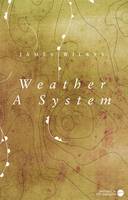Bracing collection of stylistic experiments that cross-breed poetry with other forms of writing and recording.
Somewhere - I don't know where - I picked up the impression that the shrewd thing for poets of an experimental bent to do was to kick off with some more 'normal' poems that merely hint at things to come, then reveal their real agenda at such a point as they are accepted as one of the pack. I suppose it's kind of like the argument, often touted by arch-critics of Brit art, that Picasso drew wonderful hands before he decided to start putting people's noses out of joint.
There is a distinct strangeness to real human voices recorded on the page that is quietly thrilling.
In any case, James Wilkes didn't get the memo. Weather A System starts with hysterical existentialism via form filling in 'MEDICAL QUESTIONNAIRE: STRICTLY CONFIDENTIAL' ("IS ELIMINATIVE MATERIALISM REALLY SUCH A DIFFICULT CONCEPT ? LET ME ANSWER THAT, YES. I STRUGGLE TO FOLD DOWN WINDBLOWN MAPS, LET ALONE HUMANITY") and ends with three transcripts of Wilkes and his posse examining and comparing London fountains, with every 'um' and 'ah' and [Inaudible] faithfully recorded. Poetry embracing the vernacular is old news, but there is still a distinct strangeness to real human voices recorded on the page that is quietly thrilling. It's neither poetry as we know it, nor like being there in the midst of conversation. It lacks the oratory sheen of, say, a court or newscast transcript and of course, doesn't feel as artfully contrived as the voices in 'The Waste Land' and its ilk. Here's a quick sample:
Sally: Oh but that's just cladding that's just brick cladding. I think.
Lawrence: Yeah.
Sally: [inaudible] you can see there's like [inaudible]
James: [inaudible] It is actually spray. You've got. We are standing in the spray [inaudible].
It's inarguably a simple trick - no literary pyrotechnics here. But it works. Perhaps in some way it simulates the act of listening in to private communications on an unreliable radio set - the excitement of being a party to something you don't quite understand and can never fully piece together. Which, one might suppose, is an apt comment on our experience of other people's lives.
Elsewhere in the book we get a broadside of Wilke's 'review' poems, which borrow the format of the literary review - not just the layout, but the presumptious, self-concerned, faceless voice - and use it as a framework for dense patterns of unreal imagery and rib-nudging jokes. Kelly Hobbs' Inner Glassware from Mintleaf Press is only 4pp and is 'illustrated delicately, with red pink and ragged of political tension'. The structure of Griet Hannay's 8 Little Curtain Rings "is cantilevered thus, so the balcony's long shadow bunches in my throat". The review of Mary Dundhed appears not to bother with the book at all, but relate a series of anecdotes sparked off by the title. As with the transcript poems, the sense of not being in on the experience is generated purposefully here, not to alienate the reader but to hold up a mirror (or rather, a hall of mirrors) to the sense of dislocation nurtured by an increasingly splintered cultural agenda. And just as a good horror movie makes memorable entertainment out of our own terror, so do these poems turn that dislocation into something exhilerating.
If you're expecting anything easier or more mainstream from the rest of the book, don't. Wilkes keeps his 'ethereal cannonade' going right through to the end, gathering up the debris of weather reports and fashion shows alike and reassembling them into tottering word-sculptures, ransacking everything from books to pub chatter for pieces which he can fit together into some out-of-control jigsaw. The blurb suggests a strong urban bias and also throws in the word 'psycho-geographical'. Don't let either of those things put you off - this is a book where the pleasure is in the technicolour range of the language and the urgent sense of not quite being there.

Dr F sez: This reads like my scrapbook, although it makes a little more sense and is organised into a smaller number of sections. There's so many distractions packed into the pages that it seems unfair for the back of the book to reduce it to 'bodypopping Belgians and bicycle couriers', both of whom only make a single appearance. Why not the bolts of camel? Or the speculative biomedical ethics? Or the beloved Pyranees fish? Or the Marine molluscs? Or the adrenal hormones? Or the tabulated forecasting? Eh?










